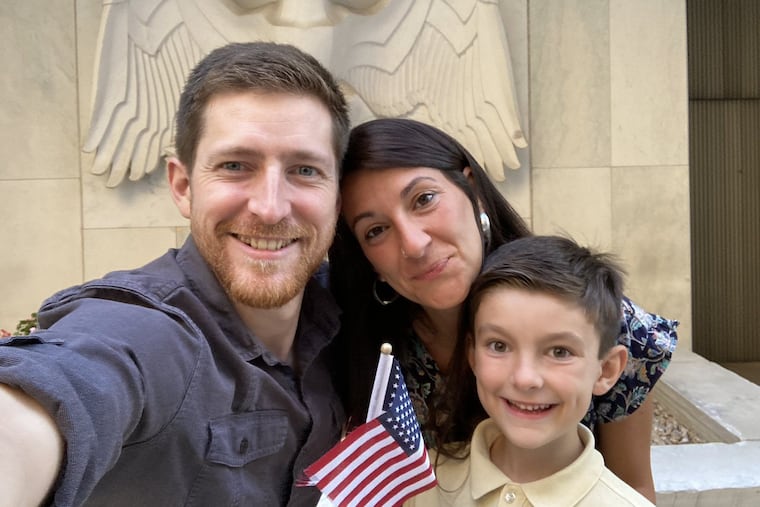New U.S. citizens could sway elections in Pennsylvania and elsewhere. But will they turn out?
In Pennsylvania, the number of new U.S. citizens exceeds Joe Biden's 80,555-vote margin of victory in the state during the presidential election

As a CASA organizer in Pennsylvania, Laila Martin Garcia spent years assisting voters, helping them register, offering language translations, and providing rides to the polls on Election Day.
Now, for the first time, she’s about to cast her own ballot.
“I’m extremely excited!” she said. “It feels so empowering.”
She came to the United States from Spain in 2016, later granted lawful permanent residence — a green card — that allowed her to live and work here indefinitely. But political attacks on immigrants upset her. In May, after meeting all the requirements and passing the test, she officially became a U.S. citizen and with that, gained the right to vote.
Today, with the midterm elections at hand, Martin Garcia, 36, is part of a large, growing, and potentially critical group of voters — newly naturalized American citizens, many about to cast their first ballots.
In Pennsylvania, the 85,083 new citizens exceed the 80,555-vote margin of Joe Biden’s state victory in the presidential election. New Jersey gained 177,890 citizens, fifth-highest in the nation.
» READ MORE: Your voter guide to the Nov. 2022 election in Pennsylvania
A study by the National Partnership for New Americans counts 5.2 million recently naturalized citizens, or as it calls them, new American voters. This group — multiracial, multigenerational, and majority women — could decide the outcomes of Senate and gubernatorial races in Pennsylvania, Georgia, Arizona, Nevada, and Florida, the report said.
The key is whether these new Americans have registered and if they’ll vote. Research shows naturalized citizens are less likely to do so than the native-born.
“The real question is not why don’t newly naturalized citizens and immigrant voters turn out,” said Amy Torres, executive director of the statewide New Jersey Alliance for Immigrant Justice, “the question is, Why aren’t campaigns in increasingly competitive elections reaching out to new voters?”
For instance, a 2022 survey found that only half of registered Asian American voters had been contacted by either major political party. Asian Americans represent the fastest-growing ethnic group in the country, up 81% since 2000, to more than 22 million people.
Campaigns that continue to focus on known, reliable voters must adapt to changes in the electorate, Torres said. In a country where voters are often decided and more elections are determined by turnout, new voters offer opportunity to candidates willing to engage them.
The National Partnership, a coalition of 60 immigrant-rights organizations in 40 states, has launched a get-out-the-vote effort that targets new citizens through ethnic media, social-media advertisements, and celebrity recruitments.
Similar efforts are happening in Pennsylvania, where the Philadelphia-based Pennsylvania Immigration and Citizenship Coalition has been making scores of phone calls and sharing information on the importance of voting.
“The impact that all these naturalized citizens could have on the upcoming elections, the current one and the presidential election in 2024 — this group by itself can help decide the outcome,” said Julio Rodriguez, the PICC political director.
It’s not lack of interest that keeps newer Americans from voting, he and others said. To even become a citizen requires enormous effort, time, and cost.
But some new Americans might not understand what can be a complicated, two-part registration and voting process. Language can be a barrier. Others may come from countries where contact with government authorities can be dangerous.
Rodriguez said his father, who immigrated from Mexico, has voted in every election since he naturalized in 2006. But English is not his first language, and getting information about candidates and issues in Spanish, though easier now, can still be challenging.
More than 80% of those who naturalized from 2016 to 2020 came here from the Americas or Asia. The vast majority, 4.4 million of the 5.2 million, chose to do so after Donald Trump, who attacked immigrant and refugee communities, was elected president.
But immigration is not the sole issue for those voters, noted Martin Garcia, who lives in Harrisburg and works for the National Partnership. For someone like her, a spouse, mother, and neighbor, issues like education and the environment are important, too.
“This voting bloc represents a powerful political force, but is not monolithic,” Nicole Melaku, the partnership’s executive director, said in a statement. “They’ll be drawn to the polls by a variety of issues, their votes informed by diverse political ideologies, experiences, and backgrounds.”
The report draws on U.S. Citizenship and Immigration Services data from 2016-20, as well as naturalization applications that the agency approved in 2021.
Thousands more new Americans are in the pipeline but are delayed from taking the oath by backlogs at USCIS. The wait for approval is 15 months in Philadelphia and longer in other cities.
In Pennsylvania, 45% of new citizens come from Asia, 27% from the Americas, 15% from Africa, and 13% from Europe. About 63% are younger than 45 and 54% are women.
The state ranks fourth on the partnership’s “Impact Model,” that is, states where new citizens could wield the greatest power because of their numbers and the closeness of key elections.
In first-ranked Georgia, for instance, the 96,469 people who naturalized between 2016 and 2020 is more than eight times the 11,779-vote margin in the last presidential election. More than 11,000 new citizens came from India alone.
“For me, the most compelling reason to become a U.S. citizen was voting,” Martin Garcia said. “Voting is one of the most powerful ways to belong. I can’t believe it’s my turn.”
